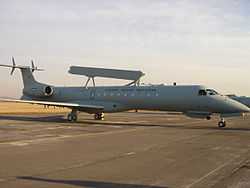Erieye
 An Embraer R-99A of the Mexican Air Force with Erieye radar mounted on the fuselage | |
| Country of origin |
|
|---|---|
| Introduced | 1996 |
| Type | Multi-mode active electronically scanned array (AESA) pulse doppler radar |
| Frequency | S-band |
| Range | 450 km |
| Altitude | > 20 km (> 65,000 ft) |
| Azimuth | 150° to each side |
The Erieye radar system, is an Airborne Early Warning and Control System (AEW&C) developed by Saab Electronic Defence Systems (formerly Ericsson Microwave Systems) of Sweden. It is based on the Active Electronically Scanned Array (AESA). The Erieye is used on a variety of aircraft platforms, such as the Brazilian Embraer E-99 or EMB-145. It has recently been implemented on the Saab 2000 aircraft.
The Erieye Ground Interface Segment (EGIS; not to be confused with the Aegis combat system) is a major component of the software used by the Erieye system.
The radar provides 300 degree coverage and has an instrumental range of 450km and detection range of 350 km in a dense hostile electronic warfare environment—in heavy radar clutter and at low target altitudes. In addition to this, the radar is also capable of identifying friends or foes, and has a sea surveillance mode.
The Erieye system has full interoperability with NATO air defence command and control systems.
History
In 1985 Ericsson Microwave Systems were contracted by the Swedish Defence Material Administration to develop what would become the PS-890 Erieye AEW radar. In the same year a dummy dual-sided phased array antenna was tested on a twin-engined Fairchild Metro aircraft. In 1987 the Metro aircraft was fitted with the radar system for flight trials. Production of the radar started in 1993 following an order for six radars for the Swedish Air Force for fitment in Saab 340 aircraft. The first two production radars were delivered in 1996.
Design


The Erieye AEW&C mission system radar is an active, phased-array, pulse-doppler sensor that can feed an onboard operator architecture or downlink data (via an associated datalink subsystem) to a ground-based air defence network. The system employs a large aperture, dual-sided antenna array housed in a dorsal 'plank' fairing. The antenna is fixed, and the beam is electronically scanned, which provides for improved detection and significantly enhanced tracking performance compared with radar-dome antenna systems. Erieye detects and tracks air and sea targets out to the horizon, and sometimes beyond this due to anomalous propagation — instrumented range has been measured at 450 kilometres (280 mi). Typical detection range against fighter-sized targets is approximately 425 kilometres (264 mi), in a 150° broadside sector, both sides of the aircraft. Outside these sectors, performance is reduced in forward and aft directions.
Other system features include: Adaptive waveform generation (including digital, phase-coded pulse compression); Signal processing and target tracking; track while scan (TWS); low side lobe values (throughout the system's angular coverage); low- and medium-pulse repetition frequency operating modes; frequency agility; Air-to-air and sea surveillance modes; and target radar cross-section display.
The radar operates as a medium- to high-PRF pulse-Doppler, solid-state radar, in E/F-band (3 GHz), incorporating 192 two-way transmit/receive modules that combine to produce a pencil beam, steered as required within the operating 150° sector each side of the aircraft (one side at a time). It is understood that Erieye has some ability to detect aircraft in the 30° sectors fore and aft of the aircraft heading, but has no track capability in this sector.[1]
Some users
 Brazil
Brazil Greece
Greece Mexico
Mexico Pakistan
Pakistan Saudi Arabia[2]
Saudi Arabia[2] Sweden
Sweden Thailand
Thailand United Arab Emirates - 2 ordered.[3]
United Arab Emirates - 2 ordered.[3]
Applications
- Embraer E-99 (EMB-145)
- Saab 340 AEW&C
- Saab 2000
References
- ↑ Janes Avionics
- ↑ Sweden initiates military cooperation with Saudi Arabia, Aftonbladet 15 May 2005 (in Swedish).
- ↑ Saab signs contract with United Arab Emirates for airborne surveillance system
External links
- Saudi interest (Swedish)
- Saab Erieye